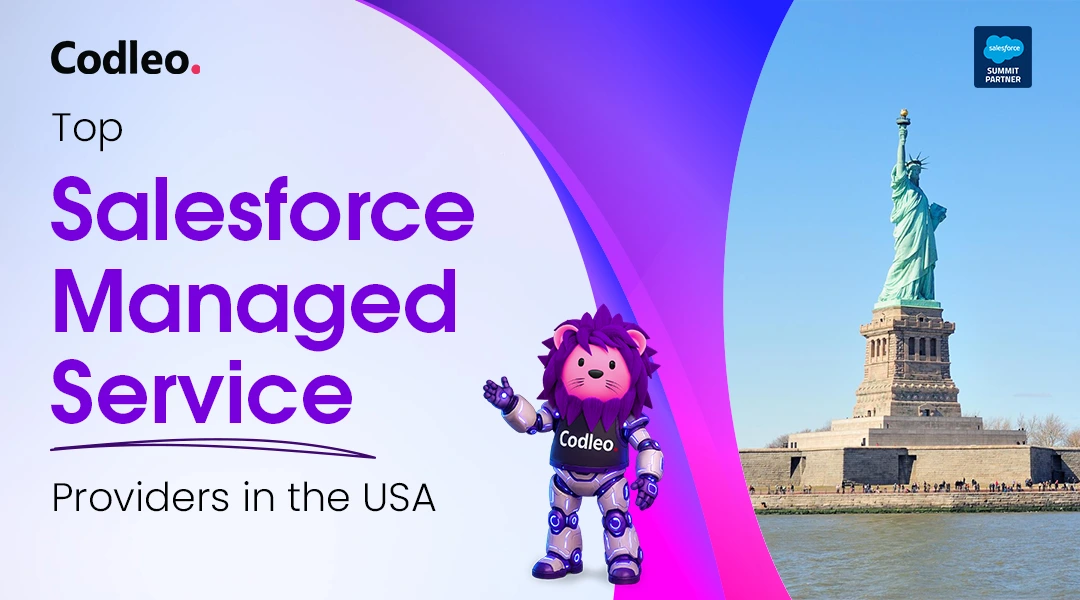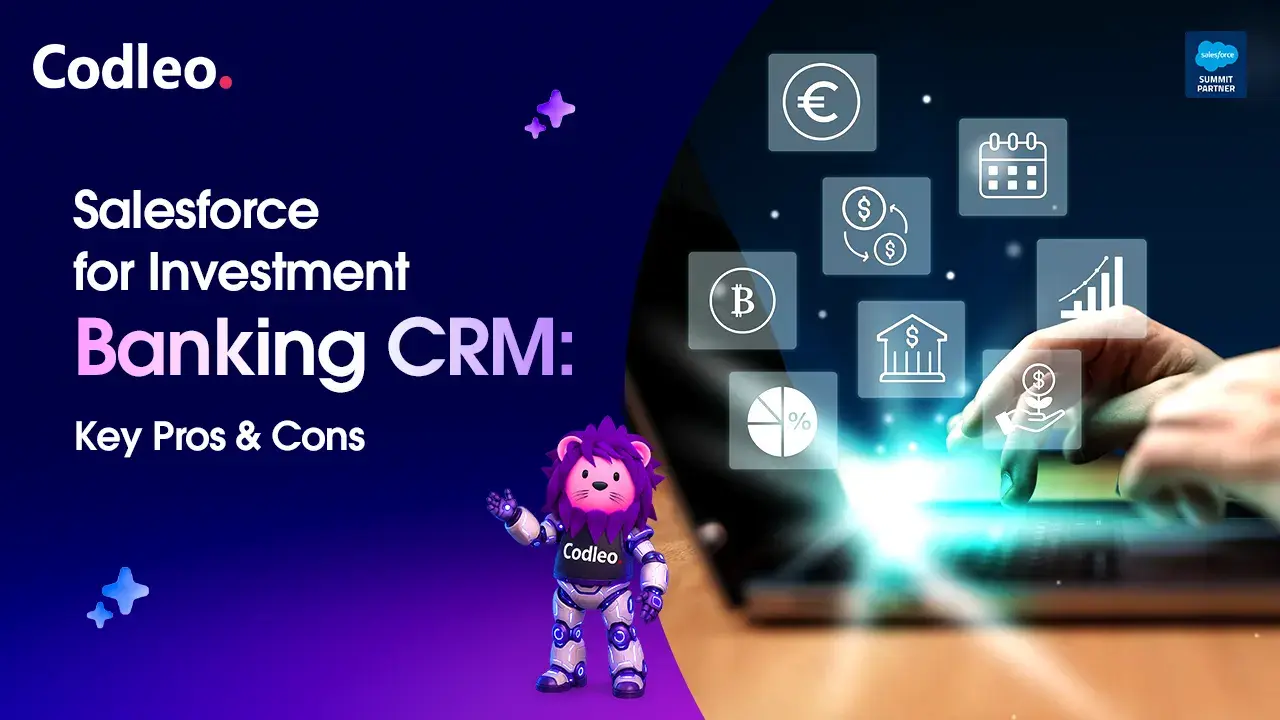Publish date:
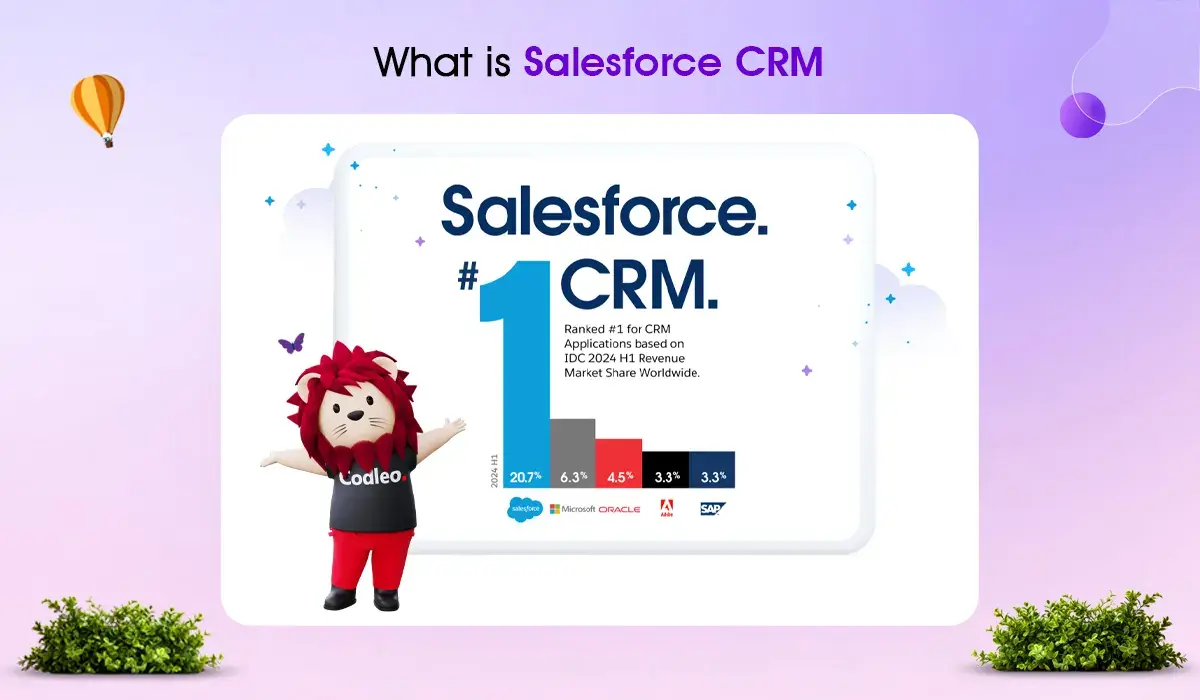
Today, I will explain why Salesforce will be the leader in the CRM market in 2025 and show how it uses data from Adobe and industry trends to stay ahead.
No fluff. No vague claims.
I will explain why Salesforce is the top CRM. I’ll look at its AI features, how it can grow with your needs, and its success based on the latest 2025 CRM market trends.
Salesforce leads the market with a 21.7% share. This success comes from innovations like Agentforce 2.0, which increases productivity and works well with platforms like Slack.
What Is Salesforce?
Salesforce is a cloud-based platform that helps businesses manage their sales, marketing, and customer service in one place. It keeps customer information, tracks interactions, and automates tasks to make work easier and improve customer relationships.
Key Features of Salesforce
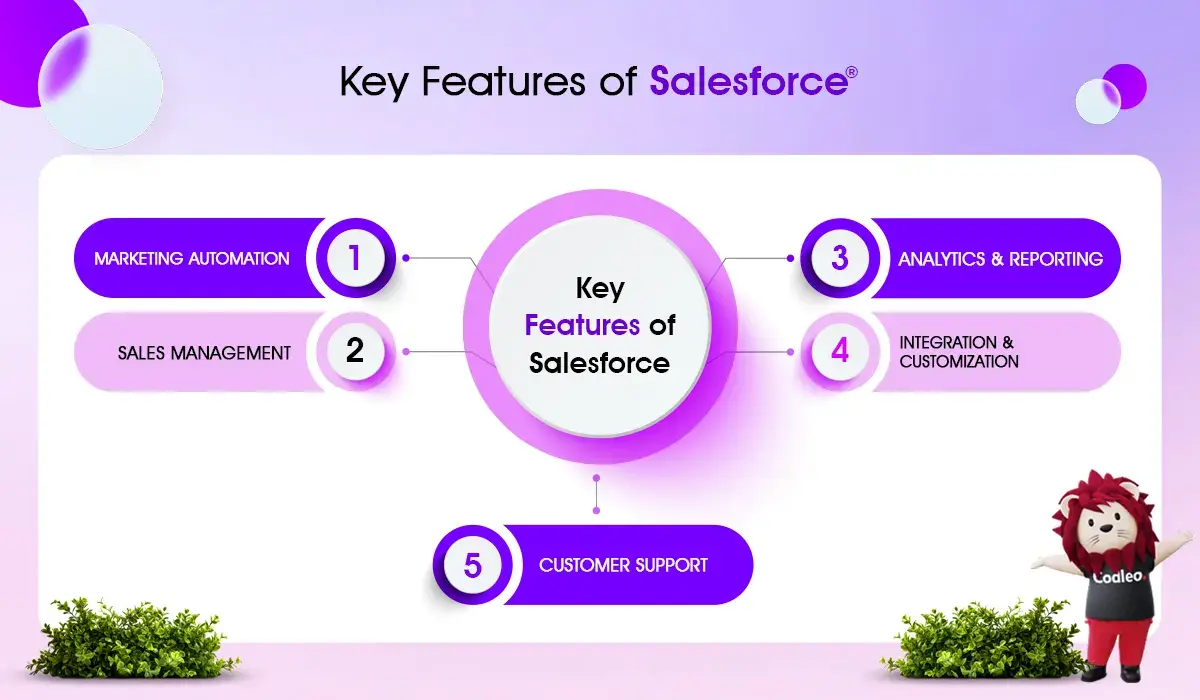
-
Sales Management: Salesforce helps companies boost sales productivity by 44% through automating lead tracking, sales forecasts, and pipeline management. On average, companies using Salesforce increase their revenue by 25%.
-
Marketing Automation: Businesses that use Salesforce Marketing Cloud see campaign efficiency improve by 30%. AI-driven insights allow companies to send personalized messages that result in higher engagement.
-
Customer Support: Salesforce Service Cloud cuts case resolution time by 31%, improving customer satisfaction. AI chatbots can automatically handle 20–30% of customer questions.
-
Analytics & Reporting: Salesforce Einstein AI provides predictive insights, helping businesses make data-driven decisions 42% faster. Companies using Salesforce analytics improve their forecasting accuracy by 38%.
Salesforce can be connected with more than 4,000 apps from the Salesforce AppExchange. Additionally, 91% of Salesforce users say its customization features help them meet their specific needs.
How Salesforce Helps Businesses Grow
Salesforce helps sales, marketing, and support teams work together better, making it easier to interact with customers. Companies that use Salesforce see improved results.
📈 25% higher revenue, thanks to better customer engagement and automated sales processes.
⚡ 35% faster deal closing rates, as teams access real-time insights into customer interactions.
🔄 45% better customer retention, due to automated follow-ups and personalized service.
Salesforce uses AI tools and automation to help businesses grow. It allows them to close deals faster and keep customers satisfied.
Who Uses Salesforce?
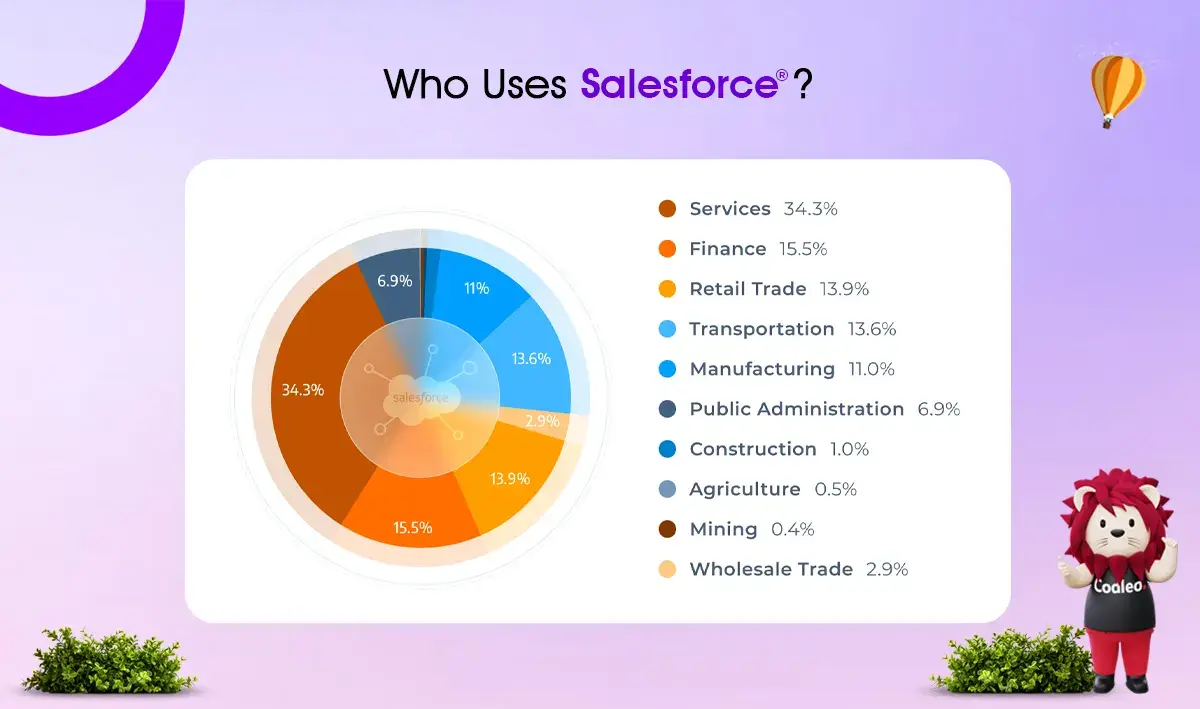
Businesses use Salesforce to manage sales, marketing, and customer service effectively. It helps companies keep track of customer interactions, automate tasks, and make better decisions.
Salesforce is flexible and can grow with the needs of small businesses, mid-sized companies, and large enterprises.
Salesforce for Businesses of All Sizes
Salesforce helps businesses of all sizes, including small, mid-sized, and large companies, manage their customers. It also simplifies processes and boosts efficiency.
-
Small Businesses use Salesforce to track leads, automate follow-ups, and improve customer relationships. A HubSpot study shows that 52% of small businesses improve customer retention with a CRM. Salesforce offers simple tools and automation that help small businesses stay organized and compete with larger companies.
-
Mid-Sized Companies – Mid-sized businesses use Salesforce to manage their sales, connect with applications, and analyze customer data. AI insights help companies predict revenue, enhance marketing, and personalize interactions. Automating tasks with Salesforce saves time and increases productivity.
-
Large Enterprises –Large companies use Salesforce to keep customer records, automate tasks, and manage operations worldwide. According to Forbes, over 90% of Fortune 500 companies use Salesforce to make data-driven decisions and manage customers.
Its security features, AI tools, and analytics help businesses run smoothly and improve performance.
Salesforce provides companies the tools to become more efficient, boost sales, and enhance customer service.
Industries That Use Salesforce
-
Finance & Banking—Banks use Salesforce to manage customer accounts, automate tasks, and ensure compliance. Some of their clients are Bank of America, American Express, and HSBC.
-
Healthcare & Life Sciences—Hospitals, drug companies, and insurance providers use Salesforce to manage patient records, support telehealth, and improve care coordination. Companies like Johnson & Johnson, Humana, and Pfizer use Salesforce to enhance their healthcare management.
-
Retail & E-commerce—Retailers use Salesforce to personalize shopping experiences, run marketing campaigns, and understand customer behavior. Companies like Walmart, Adidas, and L’Oréal use Salesforce to boost sales and effectively engage customers.
-
Technology & Software – Tech companies use Salesforce to manage clients and improve sales. IBM, Spotify, and AWS use it to enhance customer service and make sales processes more efficient.
-
Manufacturing & Automotive: Manufacturers and car makers use Salesforce to track their supply chains, manage their dealer networks, and improve services after a sale.
Companies like Ford, Michelin, and Caterpillar use Salesforce in their operations.
Top Companies Using Salesforce
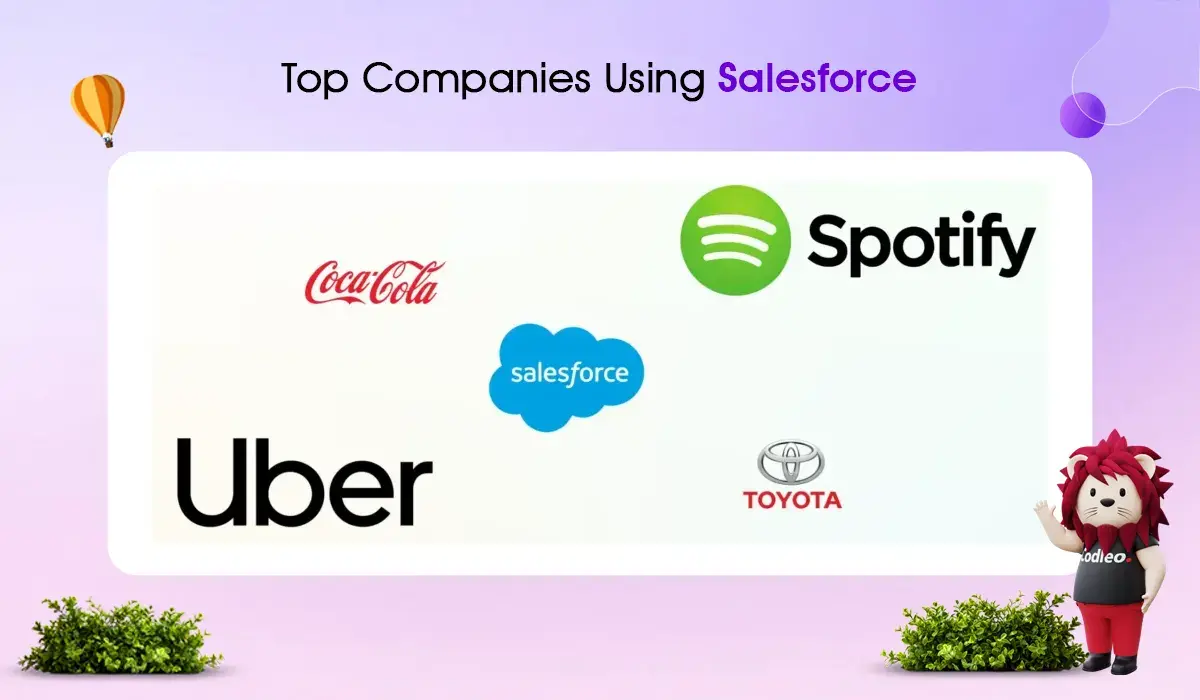
Top companies use Salesforce to manage customer relationships, automate repetitive tasks, and boost efficiency. Businesses in automotive, technology, retail, and finance use its AI tools to increase sales and improve customer service.
-
Coca-Cola: Coca-Cola uses Salesforce to track customer interactions and automate marketing campaigns. This system helps the company create personalized promotions, increase engagement, and boost sales.
-
Toyota: Toyota uses Salesforce to manage its dealer networks and customer service. This platform helps Toyota understand customers' preferences, makes support easier, and improves communication with dealers.
-
Uber: Uber uses Salesforce to analyze customer feedback and improve support services. Automation helps them resolve issues faster, enhancing experiences for both riders and drivers.
-
Spotify: Spotify uses Salesforce AI to understand how users behave and suggest music they might like. This platform helps Spotify improve its marketing and keeps users interested.
Companies rely on Salesforce to improve operations, build customer relationships, and boost revenue. Its CRM tools and automation, powered by AI, help businesses work more efficiently and serve their customers effectively.
Why Salesforce is the Number 1 CRM in 2025?
People often say money can’t buy happiness, but have you seen a sales team using Salesforce? Their closed deals, automated tasks, and helpful insights might change your mind.
Salesforce will lead the CRM market in 2025 because businesses trust it to handle sales, marketing, and customer service effectively.
Companies choose Salesforce over other CRMs because it grows with their business and integrates with essential tools. Startups, small businesses, and big companies use Salesforce to smooth operations and enhance customer relationships.
Salesforce automates repetitive tasks, allowing teams to focus on selling and improving customer experiences.
Gartner’s Magic Quadrant has named Salesforce the top CRM for over ten years. It stays on top with AI-driven automation, real-time data insights, and smart integrations.
With Salesforce, businesses make quicker decisions, improve workflows, and boost productivity.
In 2025, CRM trends will focus on AI automation, personalized customer experiences, and smooth software integrations.
Salesforce leads these trends by offering innovative tools that help businesses close deals faster and serve customers better. Its ability to innovate and adapt keeps it the most trusted CRM in the world, ensuring sales teams continue to succeed.
How Did Salesforce Become the World’s Leading CRM?
Salesforce leads the CRM industry by bringing new ideas, buying essential companies, and enhancing its platform. It has changed how businesses manage customers, track sales, and automate tasks.
By moving CRM to the cloud, Salesforce allows businesses to access customer data from anywhere, helping them grow faster.
A History of Innovation and Growth
Marc Benioff, Parker Harris, Frank Dominguez, and Dave Moellenhoff founded Salesforce in 1999 in San Francisco. They aimed to replace costly, on-premise CRM software with a cloud-based system.
Before Salesforce, companies had to install CRM software on their servers, which required big budgets and IT teams.
Salesforce changed this by offering a web-based CRM that businesses could easily access without complicated installations.
SaaS Model: A New Way to Use CRM
Salesforce created Software-as-a-Service (SaaS), which lets companies pay a subscription fee instead of buying software licenses. This approach makes customer relationship management (CRM) more affordable and easier to scale. Salesforce launched its first product in 2000. 2004 it went public and raised $110 million, gaining more customers.
Expanding Through Acquisitions
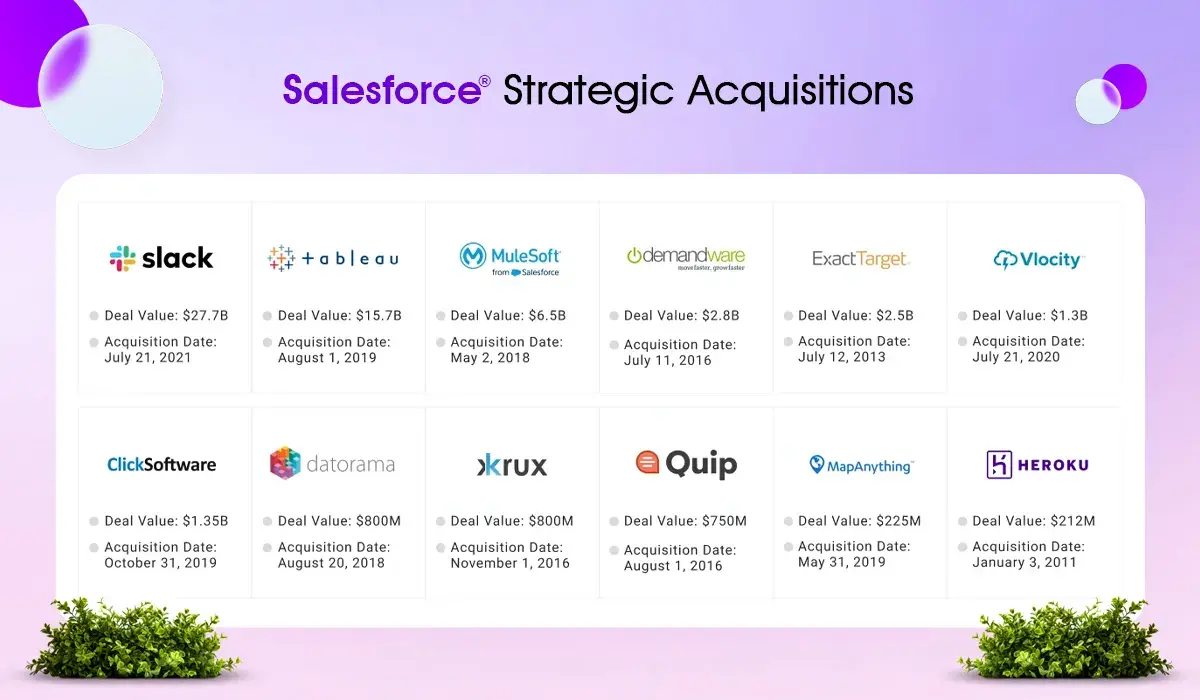
Salesforce grew quickly by buying companies that added value to its platform. Some of its most significant purchases include:
-
Slack (2021, $27.7 billion) – Added messaging and team collaboration.
-
Tableau (2019, $15.7 billion) – Improved data analysis and visualization.
-
MuleSoft (2018, $6.5 billion) – Enhanced system and app integration.
-
ClickSoftware (2019, $1.35 billion) – Strengthened field service automation.
Salesforce made several acquisitions to improve communication, connect data, and automate workflows.
From Classic to Lightning: Evolving the Platform
Salesforce has continually improved its platform:
Salesforce Classic (1999-2015) offered essential tools for sales tracking, customer management, and reporting.
Lightning Experience (2015-Present) made navigating easier, added AI insights, and provided automation tools to improve efficiency.
Salesforce is the top CRM because it adapts to business needs, invests in AI, and focuses on automation. Its focus on innovation and growth helps companies sell more effectively, serve customers better, and grow faster.
Unmatched Market Share and Industry Recognition
According to the IDC 2024 report, Salesforce has a 23.8% share of the CRM market. It performs better than Microsoft, SAP, and Oracle by offering businesses tools for AI-driven automation, real-time insights, and easy integrations.
Companies choose Salesforce because it simplifies sales, marketing, and customer service, helping teams work faster and more efficiently.
For 14 years, Gartner has named Salesforce the top CRM in its Magic Quadrant report.
It shows that Salesforce helps businesses manage customer relationships, automate tasks, and make better decisions.
Salesforce offers AI tools that help companies gain quick insights. These tools allow sales teams to close deals faster and improve customer interactions.
Over 150,000 businesses, including Amazon, Adidas, and T-Mobile, use Salesforce to track sales, automate tasks, and personalize customer experiences.
These companies enjoy better efficiency in their operations and improved client interactions thanks to Salesforce's strong features.
Salesforce helps businesses work better, grow their sales, and improve performance.
Salesforce is the top choice for customer relationship management (CRM) among companies worldwide because it uses automation, AI, and cloud solutions.
What Features Make Salesforce the #1 CRM?
Salesforce is the leader in the CRM market. It uses AI to automate tasks, provide predictive analytics, and create personalized customer interactions.
These features help businesses simplify sales, boost efficiency, and make better decisions.
AI-Powered Automation and Predictive Analytics
Salesforce Einstein AI helps automate sales tasks and predict trends. It analyzes customer data to give real-time insights. This allows sales teams to find leads, forecast revenue, and close deals faster.
By automating repetitive tasks, teams can focus on essential activities that drive growth.
AI tools like chatbots, lead scoring, and sentiment analysis improve customer interactions. Chatbots manage routine questions, allowing support teams to handle more complex issues.
Lead scoring ranks prospects based on engagement, helping sales teams prioritize their best opportunities.
Sentiment analysis tracks customer feedback, enabling businesses to respond quickly and enhance their service.
Generative AI personalizes customer communication at scale. Based on customer data, it creates custom emails, product recommendations, and targeted marketing campaigns.
Businesses use this technology to boost engagement, improve retention, and increase sales.
Salesforce combines AI, automation, and data analytics to help businesses sell better, serve customers effectively, and grow faster.
Its predictive insights and real-time data keep companies ahead of the competition while simplifying and streamlining CRM management.
Industry-Specific CRM Solutions for Maximum Customization
Salesforce provides CRM solutions for different industries. Businesses use these tools to manage sales, automate workflows, and improve customer interactions.
Companies can choose pre-built solutions or build custom applications with simple development tools.
Solutions for Sales, Marketing, and Customer Service
-
Sales Cloud – Helps sales teams track leads, manage pipelines, and close deals faster.
-
Service Cloud – Automates customer support with AI chatbots, case tracking, and self-service portals.
-
Marketing Cloud – Uses AI to analyze customer data, run targeted campaigns, and measure engagement.
-
Commerce Cloud – Enables businesses to sell products online and improve the shopping experience.
Industry-Specific CRM Solutions
-
Financial Services Cloud – Helps banks and insurance companies manage clients, track transactions, and meet compliance requirements.
-
Health Cloud – Supports healthcare providers in storing patient records, managing telehealth, and tracking treatments.
-
Manufacturing Cloud – Assists manufacturers in forecasting demand, managing supply chains, and optimizing production.
Custom Applications with Low-Code and No-Code Tools
Salesforce helps businesses create custom applications without needing to code. Companies can change workflows, add new features, and connect third-party tools using simple drag-and-drop tools in AppExchange.
Salesforce solutions help businesses work more efficiently, improve operations, and strengthen customer relationships.
Seamless Integrations and API-First Architecture
Salesforce connects different systems using its API-first design. Mulesoft helps businesses integrate ERP systems, e-commerce platforms, and other applications.
These connections allow companies to manage data effectively and automate tasks.
Salesforce works with Google Workspace, Microsoft 365, AWS, and SAP, enabling teams to access and share real-time information.
Whether businesses use cloud-based or on-premise tools, Salesforce synchronizes data across all platforms.
The open API system lets businesses create custom workflows. To improve operations, companies can automate processes, sync databases, and connect external tools.
With smooth connections, Salesforce helps businesses save time, reduce manual work, and make quicker decisions.
Why Do Businesses Prefer Salesforce Over Other CRMs?
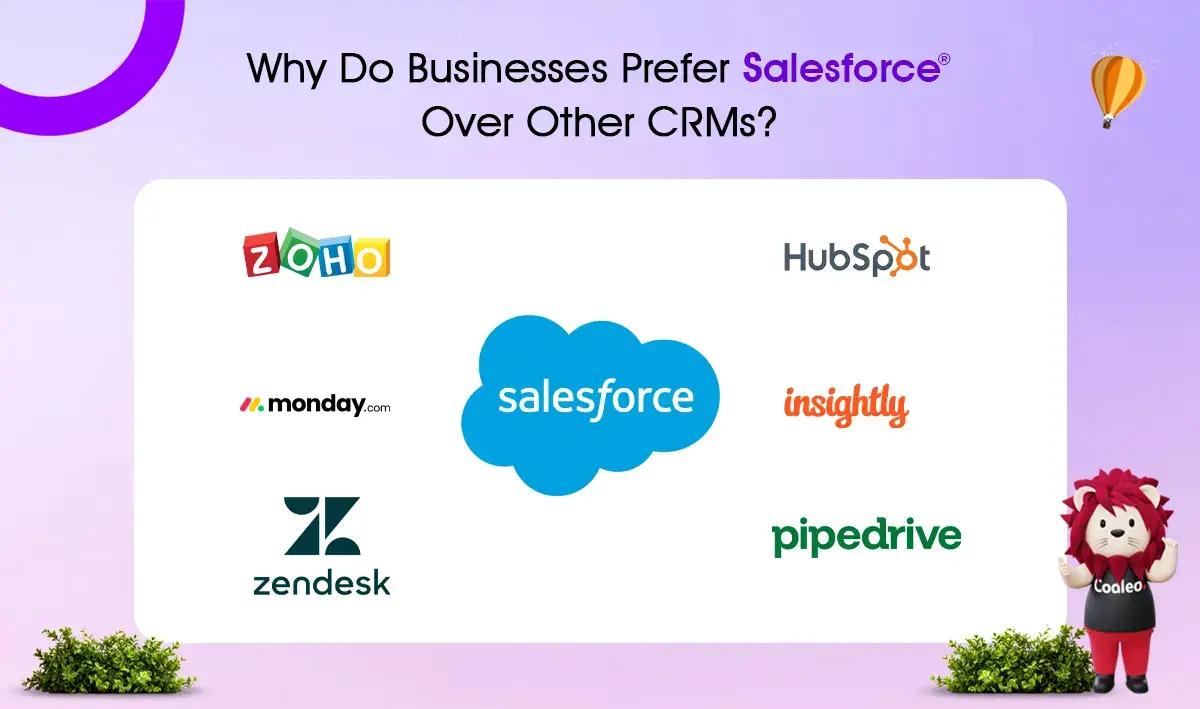
Businesses choose Salesforce because it helps automate tasks, connects teams, and grows with their needs. Its innovative CRM features, solutions for different industries, and strong support make it the preferred choice for companies worldwide.
Market Share and Global Customer Adoption
Over 90% of Fortune 500 companies trust Salesforce to manage their sales, marketing, and customer service.
Businesses in finance, healthcare, retail, and manufacturing use Salesforce to improve operations and enhance customer experiences.
More than 4.5 million developers create custom applications on Salesforce. It helps companies expand their CRM features and meet specific needs.
Salesforce grows with businesses, offers AI-driven insights, and makes customer management more effortless.
Superior Customer Experience and 24/7 Support
Salesforce improves customer experience with 24/7 support. It helps businesses better connect with their customers using learning tools, multi-channel support, and organized data.
Trailhead is a free learning platform that teaches users, administrators, and developers how to manage customer relationship management (CRM) tasks. Companies can train their teams in automation, AI, and data management at no extra cost.
Salesforce provides help through chat, phone, email, and self-service options. AI chatbots answer simple questions, while live agents are available for more complex issues.
Quick responses lower downtime and increase efficiency, allowing businesses to focus on customer needs.
Customer 360 creates a single profile for each customer by gathering data from various sources.
Businesses use this tool to track interactions, send personalized offers, and enhance their service.
Companies can make better decisions and build stronger relationships with a full view of each customer.
Innovation and Leadership in Our Industry
Salesforce spends over $10 billion yearly on research and development to improve AI, automation, and blockchain technology.
These improvements help businesses work better, reduce manual tasks, and protect customer data.
AI tools offer insights into customers' actions, while blockchain enhances security and transparency.
Dreamforce is Salesforce’s annual event that brings together industry leaders, developers, and customers.
The event highlights new technologies, business strategies, and updates on CRM, helping businesses stay informed and competitive.
Salesforce also prioritizes sustainability with Net Zero Cloud, a tool that helps businesses track and reduce carbon emissions.
Companies can monitor their energy use, assess their environmental impact, and strive for sustainability goals.
Salesforce provides businesses with tools to work efficiently while minimizing their environmental impact.
How Salesforce Helps Businesses Increase Revenue?
Salesforce helps businesses increase revenue by automating sales, enhancing data insights, and personalizing customer interactions.
Its AI tools enable sales teams to focus on essential leads, close deals more quickly, and connect with customers more effectively.
Sales automation and lead prioritization powered by AI.
Salesforce uses AI to help sales teams focus on the best leads. Einstein Lead Scoring ranks leads by their likelihood of buying, so teams can concentrate on the most promising opportunities.
Pipeline inspection tools track the progress of deals, allowing businesses to forecast revenue more accurately.
Revenue Cloud simplifies pricing, billing, and subscription management. Sales teams can send accurate quotes, handle renewals, and close deals quickly without being slowed down by manual work.
Making Decisions Based on Data with Real-Time Analytics
Salesforce helps businesses make better decisions by providing real-time insights. Tableau CRM creates visual reports that show sales performance and highlight trends.
AI recommendations guide sales teams in adjusting their strategies based on data.
Automated reporting eliminates manual data entry, which reduces errors and saves time.
Sales teams receive current reports, enabling them to make informed decisions and focus on growing revenue.
Customizing Customer Experiences and Focused Marketing
Salesforce AI helps businesses create personalized experiences for their customers. Marketing Cloud AI analyzes customer behavior and changes campaigns to deliver the right message at the right time.
Predictive analytics find chances for upselling and cross-selling, which increases customer value.
Omnichannel engagement connects businesses with customers through email, social media, mobile, and websites, ensuring consistent and relevant interactions.
Salesforce helps businesses sell more, work smarter, and build better customer relationships.
Its AI and automation tools help companies become more efficient, close deals, and drive revenue growth.
How Secure and Compliant Is Salesforce?
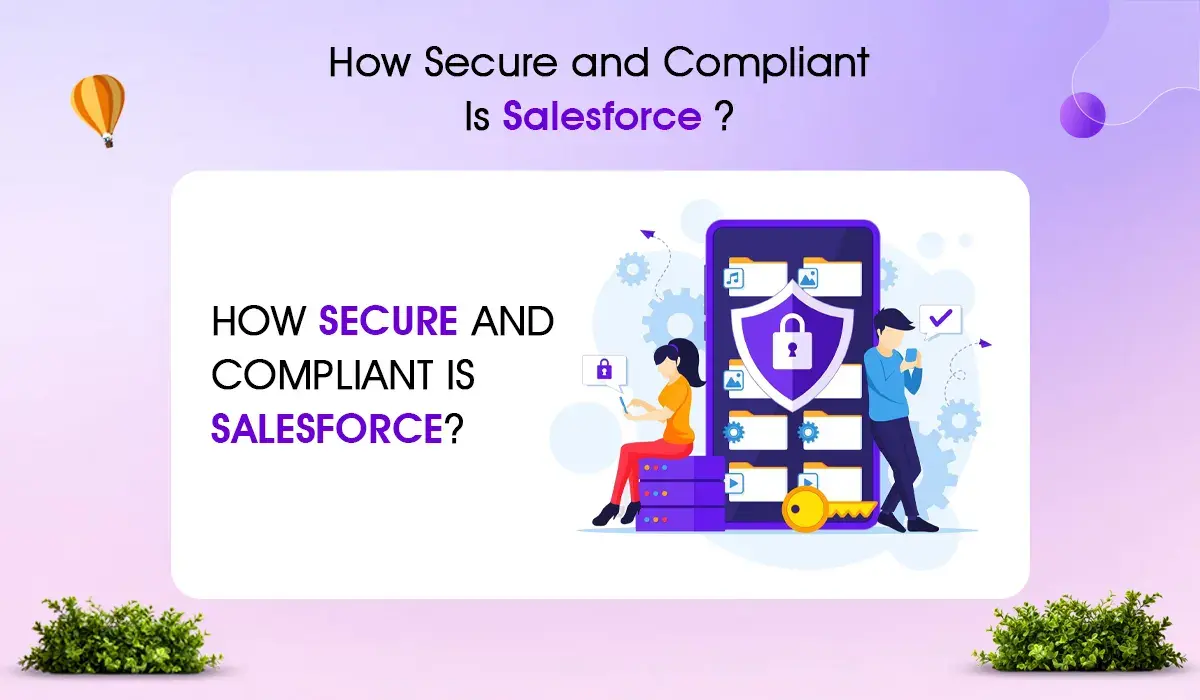
They say, “If you’re not paying for the product, you are the product.” With Salesforce, security is the priority. Businesses trust Salesforce because it protects data, prevents breaches, and meets global compliance standards.
Salesforce has security features ensure only the right people access the correct data at the right time.
High-Level Security and Data Safeguarding
Salesforce uses a zero-trust security model. This means that every user and device is checked before granting access.
This approach stops unauthorized access and improves security. Multi-factor authentication (MFA) adds extra steps to confirm a user's identity.
If someone steals a password, Salesforce will deny access without the second verification step.
Salesforce protects data with strong encryption. It keeps information safe both when it’s stored and when it’s sent.
Businesses set access levels to ensure only approved users can see or change sensitive information.
Salesforce also includes disaster recovery and real-time backup systems to avoid data loss.
These tools automatically back up data and allow quick recovery if failures or cyberattacks occur.
The system checks for unusual activity and notifies administrators about potential threats.
Compliance with Global Regulations
Salesforce follows strict security and data privacy laws to help businesses stay compliant. It adheres to GDPR, CCPA, HIPAA, and SOC 2 regulations, ensuring companies protect customer data, follow privacy laws, and store information safely.
Salesforce offers solutions for specific industries to help businesses meet compliance standards. For example, Financial Services Cloud meets banking and financial security requirements to keep transactions and client records safe. Health Cloud helps maintain HIPAA compliance, protecting patient data and electronic health records.
Salesforce provides tools to track user activity and system access. These tools help businesses generate reports and comply with regulatory standards.
Salesforce keeps business data secure, compliant, and protected. Its security framework ensures businesses operate safely, reduce risk, and maintain customer trust.
Future of Salesforce: What’s Next in 2025 and Beyond?
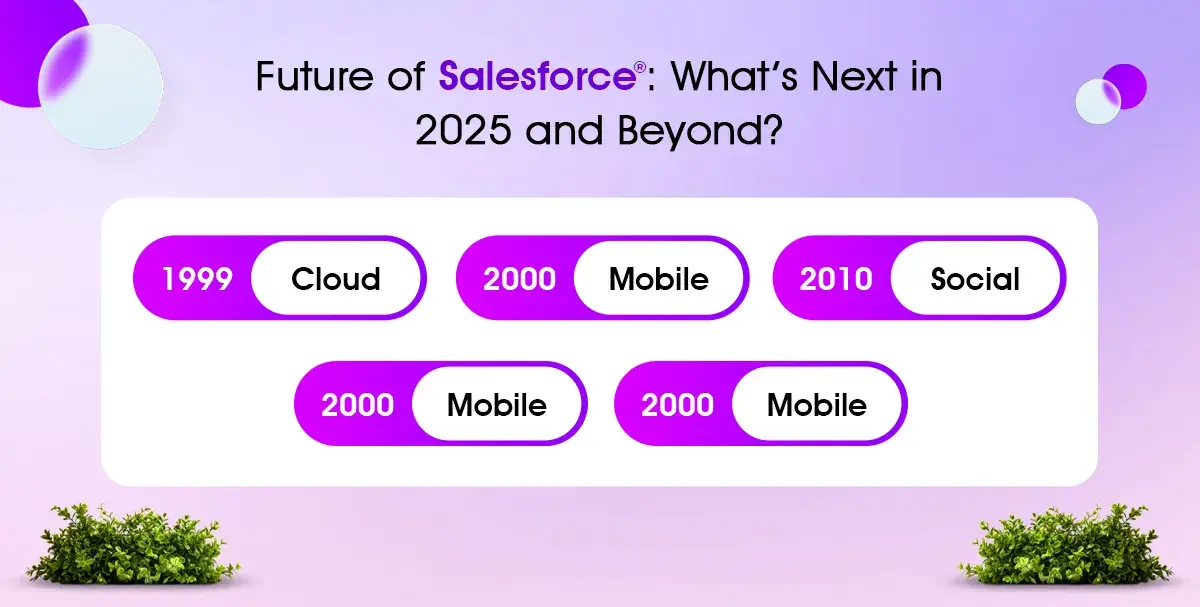
Salesforce is improving its AI, increasing security, and expanding worldwide.
Businesses will benefit from faster automation, better data protection, and solutions designed for their industries.
These updates help companies work more efficiently, keep customer data safe, and grow into new markets.
Expanding AI and Automation Capabilities
Salesforce is improving Einstein AI 2.0 to make it smarter. It now has better natural language processing (NLP) and machine learning.
Businesses will gain better customer insights, more intelligent automation, and quicker decision-making.
New AI tools will help teams reduce manual work and focus on selling.
AI meeting assistants summarize discussions, highlight key points, and suggest follow-ups. Automated email composers draft responses based on customer history.
AI-driven sales recommendations help teams find high-value leads, making sales cycles shorter and more effective.
Blockchain and IoT for CRM Data Security
Salesforce is using blockchain technology to make data more secure and trustworthy. Salesforce Blockchain keeps customer records in a secure ledger that cannot be tampered with.
This prevents unauthorized changes and ensures data accuracy, which is essential for the finance, healthcare, and supply chain management industries.
Salesforce is also enhancing its Internet of Things (IoT) capabilities. The IoT Cloud links real-time data from smart devices to Salesforce.
It helps businesses monitor products' performance, predict when maintenance is needed, and improve customer support.
For instance, a company that sells smart appliances can track how customers use their products and fix issues before they occur.
Growth in Emerging Markets and Industry Expansion
Salesforce is growing in Asia-Pacific, Latin America, and Africa as more businesses shift to cloud-based CRM solutions.
The company is building its infrastructure and customizing solutions to fit different regions.
Salesforce also introduces new government, legal, and education tools. Government agencies use it to manage records and automate public services.
Law firms track cases, contracts, and client interactions. Schools and universities use Salesforce to handle student records, admissions, and digital learning.
Sustainability is still essential. Net Zero Cloud helps businesses track carbon emissions, monitor energy use, and meet environmental goals. Companies use it to reduce waste, follow climate rules, and report on their sustainability efforts.
With better AI, stronger security, and a growing global presence, Salesforce is changing the future of CRM. With Salesforce's support, businesses can sell faster, protect data, and enter new markets.
Is Salesforce the Right CRM for Your Business?
Choosing a CRM is like picking a coffee blend—it can give you quick results or change and improve as your business grows.
Many businesses wonder why Salesforce is so popular. The answer is straightforward.
Salesforce is flexible, uses AI to automate tasks, and can be customized to fit specific needs.
It helps companies manage sales, marketing, and customer service in one place, making it a reliable choice worldwide.
Key Factors to Consider Before Choosing Salesforce
Salesforce is suitable for startups, small businesses, and large companies. Its flexibility helps businesses grow by expanding their CRM functions.
Companies that need long-term solutions with advanced automation benefit from Salesforce’s ability to manage complex workflows and integrations.
Salesforce has four pricing plans: Essentials, Professional, Enterprise, and Unlimited. Each plan meets different business needs.
When compared to Salesforce and HubSpot, HubSpot provides simple tools that are easy to use, while Salesforce offers custom automation, AI-driven insights, and the ability to scale for complex operations.
Customization is a key benefit of Salesforce.
It offers low-code and pro-code options, allowing businesses to adjust workflows, add integrations, and create custom applications.
Companies looking for detailed automation and AI insights often choose Salesforce.
Real-World Success Stories of Salesforce Implementation
Salesforce is helping major brands succeed by improving efficiency and customer relationships.
Adidas uses Salesforce AI to personalize its marketing campaigns. By analyzing what customers like, it sends targeted promotions, which boosts customer retention and sales.
T-Mobile improved its customer service by using Salesforce Service Cloud. The automation powered by AI speeds up response times, allowing them to solve customer issues quickly and increase satisfaction scores.
Amazon Web Services (AWS) improved its B2B marketing by connecting Salesforce with its existing tools. This integration helps AWS track leads, enhance sales forecasting, and build better customer relationships.
Maximizing Salesforce Implementation for Increased Return on Investment
Businesses need a clear plan and a well-organized setup to achieve the best results with Salesforce.
1️⃣ Assess Business Needs – Set clear goals for sales, marketing, and customer service. When comparing Salesforce and HubSpot, HubSpot is good for basic customer relationship management (CRM), while Salesforce offers more advanced automation and is better for scaling your business.
2️⃣ Migrate Data and Integrate Systems – Move existing customer data into Salesforce. Businesses connect it to email, marketing, and analytics tools to keep operations running smoothly.
3️⃣ Train Employees – Use Trailhead and Salesforce certifications to train teams on automation, reporting, and AI analytics.
4️⃣ Automate Workflows – Set up automation with AI for tracking leads, following up with customers, and managing campaigns. This will help teams focus on tasks that add the most value.
5️⃣ Monitor and Optimize Performance – Use real-time analytics to track your success, adjust your strategies, and increase your revenue.
Salesforce is a top choice for businesses looking for CRM solutions because it works.
It helps companies achieve higher sales, automate tasks, and improve customer experiences.
With Salesforce, businesses can organize customer data, track leads, and simplify workflows.
Its AI features help sales teams close deals more quickly, understand customer needs, and personalize marketing.
Companies of all sizes use Salesforce. Startups automate tasks and manage leads, while large businesses scale their operations and enhance global sales strategies.
Salesforce works across industries.
Banks, healthcare providers, retailers, and manufacturers use it to protect data, improve work processes, and meet regulations.
Its ability to adapt with customization options and integrations makes it suitable for any business need.
Salesforce is the leader because it helps businesses work more efficiently, increase sales, and build strong customer relationships.
Its mix of AI, automation, and flexibility keeps it the world's top CRM.
Why is Salesforce so special?
Salesforce provides tools to help businesses meet customer expectations. It offers data tools, AI, and top CRM applications for sales, service, marketing, commerce, and IT—all on one platform.
What is the number 1 CRM in the world?
Salesforce helps businesses manage sales and improve customer relationships using AI, real-time data, and CRM tools. IDC’s 2024 H1 Revenue Market Share report states that Salesforce is the top choice for CRM applications. It increases productivity and supports business growth with AI-driven insights.
What are the advantages of Salesforce?
Salesforce works well with ERP systems, data storage, and email tools. This helps companies maximize their technology investments and automate tasks, improving efficiency and managing workflows.
How is Salesforce different from other CRMs?
The Salesforce Platform helps businesses grow by offering extendable apps, easy integration with other tools, and strong cloud security. Companies use it to boost efficiency and stay ahead of their competitors.
Is Salesforce the leader of CRM?
Salesforce is the global leader in customer relationship management (CRM). It has the largest market share in North America, Latin America, Western Europe, Asia-Pacific, and Japan.
FAQ
Salesforce offers cloud-based customer relationship management (CRM) solutions and applications. These tools focus on improving sales, customer service, marketing, analytics, and application development. They help businesses streamline their processes and build better relationships with customers.
Salesforce makes it easier to manage customers and sales. It helps with tracking leads, managing contacts, sending marketing emails, and scoring leads to improve business operations.
Salesforce helps businesses organize customer information, simplify sales tasks, manage marketing campaigns, and provide valuable analytics. It improves customer relationships and boosts sales efficiency.
SaTo implement Salesforce CRM, you need to plan, configure, customize, deploy, and improve the platform to meet your business needs. These steps are fundamental, but the specific steps may change based on your business's needs. You can refer to Salesforce implementation best practices to ensure your CRM aligns with your needs.
The cost of Salesforce CRM depends on several factors, including your organization's needs, the edition you choose, the features you require, and the number of users. Each Salesforce product has its pricing plans. To understand the cost for your business, it’s best to consult with a Salesforce consultancy firm.
Salesforce CRM stands out in various ways. It introduces new features, products, and services to help businesses grow while meeting today’s needs. Additionally, Salesforce focuses on its customers, placing them at the center of its decisions and actions.






